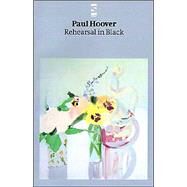Rehearsal in Black
, by Hoover, Paul- ISBN: 9781876857318 | 1876857315
- Cover: Paperback
- Copyright: 11/1/2001
In a review of Paul Hoover's work, poet and critic Gillian Conoley refers to its "appetitive inclusionary impulse," Writing on Viridian, Mary Jo Bang commented: "There is a cool precision in these poems, a striking aptness in the marrying of word to word. And in many of them, there is an unexpected tenderness only half-masked by Hoover's allegiance to exploring and mapping language's inherent imperfection.... Hoover's concern with language's representational inadequacy is shared by the L=A=N=G=U=A=G=E poets he's championed for years in New American Writing and included in Postmodern American Poetry. However his own poems are more direct, more lyrical, and sometimes seethingly and seductively melancholic. Central to all of them (regardless of language's irrefutable limitations) is his keen intelligence and laconic wit." The tension between the lyrical and the abstract and the use of traditional forms for postmodern means are among the most consistent features of Hoover's poetry. In his last three collections, he has explored the unusual poetic form of counted verse, in which the line is determined by the number of words rather than syllables it contains. Inspired by Louis Zukofsky's "A-14," his use of counted verse further emphasizes his alternating expansion and contraction of attention. As John Olson comments in a review of Totem and Shadow: New & Selected Poems, "This method of building a poem gives the language a heightened materiality, as if words were mortared together like bricks. The syntax is highly compressed, and one's reading is forcibly slowed down; one is constrained to focus a deepened attention on each word. We are encouraged to study how we observe, to perceive how language interphases with the external world, to perceive how we perceive." The knit of attention in each poem continues until the inner and outer minds find resolution. Attention passes through several relational pulses or turns over the course of these longer poems: "To be temporary / here, to say / the word weakness / to the blinding / chorus or sink / in counter song / is all the / lovely spending, not / the true story / but what might / follow." Rather than pay homage to the insufficiencies or limits of language, Hoover turns postmodern technique to the advantage of expression. His is a poetry of quickly revolving consciousness that bridges quickly a variety of subject matters and concerns. But it also gazes directly at the beauty of ordinary events in which "the blacktop / shines on such / afternoons" or "rain / in Cleveland settles / on the game." As he writes in the poem "Lights on Bridges," poetry is a means of finding one's way, through motion and sound, "out into / the brilliance."







